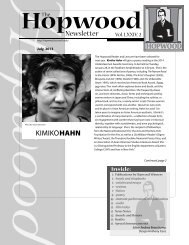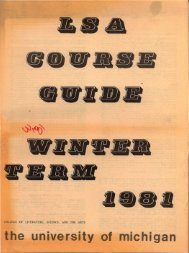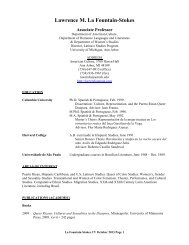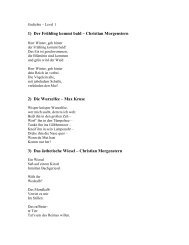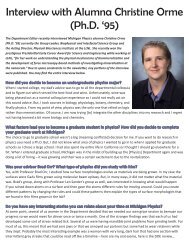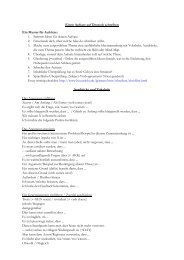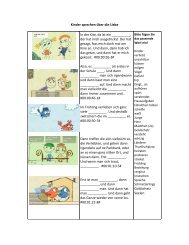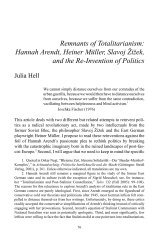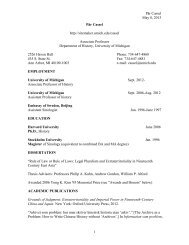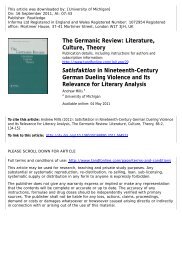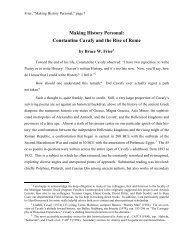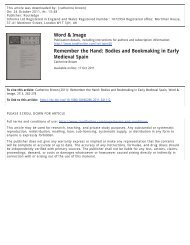Newsletter - College of Literature, Science, and the Arts - University ...
Newsletter - College of Literature, Science, and the Arts - University ...
Newsletter - College of Literature, Science, and the Arts - University ...
You also want an ePaper? Increase the reach of your titles
YUMPU automatically turns print PDFs into web optimized ePapers that Google loves.
ds ds<br />
Department <strong>of</strong> Germanic Languages & <strong>Literature</strong>s<br />
<strong>Newsletter</strong><br />
Letter from <strong>the</strong> Chair . . . . . . . . . . . .2<br />
Undergraduate Connection . . . . . . . .3<br />
Faculty <strong>of</strong> Excellence . . . . . . . . . . . .4<br />
Graduate Student Focus . . . . . . . . . .5<br />
In <strong>the</strong> Classroom. . . . . . . . . . . . . . . .6<br />
Congratulations Graduates. . . . . . . .7<br />
Dutch Studies . . . . . . . . . . . . . . . . . .8<br />
Sc<strong>and</strong>inavian Studies . . . . . . . . . . . .9<br />
Development . . . . . . . . . . . . . . . . .10<br />
Development Showcase . . . . . . . . .11<br />
Watch <strong>the</strong> German Day 2009 Video!<br />
Go to “www.lsa.umich.edu/<br />
german” <strong>the</strong>n click on <strong>the</strong><br />
“German Day 2009 Video“<br />
link in <strong>the</strong> upper right.<br />
www.lsa.umich.edu/german SUMMER 2009
gds<br />
Department <strong>of</strong> Germanic Languages & <strong>Literature</strong>s<br />
Letter from <strong>the</strong> Chair<br />
2<br />
Dear Friends,<br />
We ended <strong>the</strong> year by celebrating <strong>the</strong> graduation <strong>of</strong> 97 German majors <strong>and</strong> minors. As most <strong>of</strong> you will know<br />
by now, <strong>the</strong>se numbers are quite unusual <strong>and</strong> a testimony to <strong>the</strong> outst<strong>and</strong>ing work <strong>of</strong> our colleagues in<br />
charge <strong>of</strong> <strong>the</strong> language program, business German, <strong>and</strong> undergraduate teaching. Among <strong>the</strong>se graduating<br />
seniors fi ve had written honors <strong>the</strong>ses in our department. As Kerstin Barndt, <strong>the</strong>ir adviser, told us at <strong>the</strong><br />
graduation ceremony, <strong>the</strong>ir <strong>the</strong>ses covered a wide range <strong>of</strong> topics - from <strong>the</strong> study <strong>of</strong> educational reforms<br />
in Germany to Gerhard Richter’s modernist window in Cologne’s famous ca<strong>the</strong>dral. We also congratulate<br />
Jonah Johnson, Jay Michael Layne, <strong>and</strong> Vera Irwin, who received <strong>the</strong>ir Ph.D.s this year with dissertations on<br />
<strong>the</strong> role <strong>of</strong> tragedy in 18th- <strong>and</strong> early 19th-century literature <strong>and</strong> philosophy, on <strong>the</strong> representation <strong>of</strong> sexual<br />
murder in interwar Germany, <strong>and</strong> on linguistic aspects <strong>of</strong> Russian immigration to Germany, respectively. We<br />
all wish <strong>the</strong>m <strong>the</strong> best <strong>of</strong> luck on <strong>the</strong> job market.<br />
I am delighted to report that Andy Markovits received <strong>the</strong> Thurnau Pr<strong>of</strong>essorship for his outst<strong>and</strong>ing<br />
teaching, <strong>and</strong> that Kerstin Barndt was promoted to associate pr<strong>of</strong>essor with tenure this year. We had <strong>the</strong><br />
good fortune to be able to hire Andrew Mills as a Lecturer III. Andrew comes to us with a Ph.D. from <strong>the</strong><br />
German Department at Indiana <strong>University</strong> on <strong>the</strong> topic <strong>of</strong> dueling in German 19th century literature. He<br />
will be teaching in <strong>the</strong> undergraduate curriculum <strong>and</strong> help ease Kalli Federh<strong>of</strong>er’s growing advising <strong>and</strong><br />
outreach load. Welcome, Andrew!<br />
We also have some sad good news to report from our day-to-day operations in <strong>the</strong> <strong>of</strong>fi ce, as two workstudy<br />
students are moving on to greener pastures: Neil Matouka will no longer work for us; instead, he will<br />
take advantage <strong>of</strong> one <strong>of</strong> <strong>the</strong> many study-abroad opportunities <strong>the</strong> department <strong>of</strong>fers <strong>and</strong> spend a year<br />
in Freiburg. Beth Frysinger, one <strong>of</strong> our Max Kade House residents, is also leaving us. Beth graduated <strong>and</strong><br />
will be teaching German—which <strong>of</strong> course is wonderful news, <strong>and</strong> once again pro<strong>of</strong> <strong>of</strong> Kalli Federh<strong>of</strong>er’s<br />
importance for our department <strong>and</strong> <strong>the</strong> fi eld <strong>of</strong> German Studies at large.<br />
The fall term will be exciting: Silke Weineck <strong>and</strong> Andreas Gailus have organized a conference on “Idealism<br />
Matters,” which will be held at <strong>the</strong> end <strong>of</strong> September. The German Embassy provided us funds to organize<br />
a series <strong>of</strong> events around <strong>the</strong> Fall <strong>of</strong> <strong>the</strong> Berlin Wall (in cooperation with CES-CEU), <strong>and</strong> a group <strong>of</strong> graduate<br />
students continues its exploration <strong>of</strong> German <strong>and</strong> o<strong>the</strong>r avant-gardes. Last but not least we look forward<br />
to welcoming back our former chair, Helmut Puff, who will join us again after having spent a well-deserved<br />
leave working on his new book. Vanessa Agnew <strong>and</strong> Kader Konuk will likewise be returning from research<br />
leaves in Germany, <strong>and</strong> we are delighted to have <strong>the</strong>m back in Ann Arbor in <strong>the</strong> Fall.<br />
With warm regards,<br />
Julia Hell<br />
hell@umich.edu<br />
www.lsa.umich.edu/german
www.lsa.umich.edu/german<br />
Department <strong>of</strong> Germanic Languages & <strong>Literature</strong>s<br />
gds<br />
Undergraduate Connection<br />
Two Classes, Two Countries, One Movie<br />
There are ongoing celebrations in Berlin <strong>and</strong> around<br />
<strong>the</strong> world this year observing <strong>the</strong> 20th anniversary<br />
<strong>of</strong> <strong>the</strong> Fall <strong>of</strong> <strong>the</strong> Berlin Wall. The Department is<br />
commemorating this event by having students<br />
produce short fi lms. This semester, a unique<br />
collaborative project was undertaken by students<br />
in two different classes within <strong>the</strong> undergraduate<br />
program. Students in German 232: Contemporary<br />
German Society <strong>and</strong> Business Culture were assigned<br />
fi nal video projects to explore <strong>the</strong> universal<br />
signifi cance <strong>of</strong> <strong>the</strong> building <strong>and</strong> subsequent tearing<br />
down <strong>of</strong> <strong>the</strong> Wall. Students in German 312: Studies<br />
in German Culture who live in <strong>the</strong> Max Kade House<br />
German Residence <strong>and</strong> who traveled to Berlin for<br />
winter break agreed to fi lm “on assignment” for<br />
students in 232.<br />
This year’s trip for <strong>the</strong> Kade students to Berlin<br />
provided a backdrop for obtaining current footage<br />
<strong>of</strong> <strong>the</strong> city. After attending a video production<br />
workshop, we obtained h<strong>and</strong>-held digital cameras<br />
<strong>and</strong> a tripod from LS&A Media Services, <strong>and</strong> boarded<br />
<strong>the</strong> plane with plenty <strong>of</strong> blank tapes. We fi lmed<br />
some things based on requests <strong>and</strong> o<strong>the</strong>r things<br />
spontaneously—everything from street scenes <strong>and</strong><br />
monuments, to lengthy guided tours <strong>and</strong> interviews.<br />
Filming for students in ano<strong>the</strong>r class, <strong>and</strong> thus<br />
having to frame perceptions <strong>of</strong> Berlin with specifi c<br />
<strong>the</strong>mes in mind, provided an occasion for Kade<br />
students to contribute <strong>the</strong>ir own perspectives. Aric<br />
Velbel, one <strong>of</strong> <strong>the</strong> photographers, reports, “I turned<br />
my attention to capturing visible instances <strong>of</strong> <strong>the</strong><br />
Wall’s legacy in contemporary life. Were Berliners<br />
more leery <strong>of</strong> <strong>the</strong>ir collective past, it would have<br />
been impossible to watch a young mo<strong>the</strong>r wheeling<br />
a stroller beside a segment <strong>of</strong> <strong>the</strong> Wall left erect as a<br />
memorial, or <strong>the</strong> tires <strong>of</strong> commuter traffi c traversing<br />
a row <strong>of</strong> cobbles embedded in <strong>the</strong> street marking<br />
where <strong>the</strong> Wall once stood. Streets where <strong>the</strong> shape<br />
<strong>of</strong> <strong>the</strong> ‘don’t walk’ light depends on <strong>the</strong> direction<br />
in which one crosses <strong>the</strong> remaining sections <strong>of</strong> <strong>the</strong><br />
Wall, lie in <strong>the</strong> shadow <strong>of</strong> former Ministry <strong>of</strong> State<br />
Security buildings—now popular disco clubs: such<br />
are <strong>the</strong> subtle things that defi ne a re-convergence<br />
<strong>of</strong> two civilizations once isolated from each o<strong>the</strong>r<br />
by ideals <strong>and</strong> kilometers <strong>of</strong> concrete.”<br />
Upon return, <strong>the</strong> footage was given to <strong>the</strong><br />
Language Resource Center to be converted from<br />
cassettes to viewing discs. Students from <strong>the</strong><br />
Contemporary German Society (CGS) class sifted<br />
through <strong>the</strong> footage <strong>and</strong> found some interesting<br />
surprises. Some groups deviated from <strong>the</strong>ir original<br />
scripts <strong>and</strong> exp<strong>and</strong>ed on new ideas. Supplemental<br />
footage was ga<strong>the</strong>red from archive.org, YouTube<br />
<strong>and</strong> o<strong>the</strong>r sources. In addition, <strong>the</strong> CGS students<br />
shot footage <strong>of</strong> <strong>the</strong>ir own in Ann Arbor. The<br />
outcome was six short fi lms with English subtitles<br />
to be screened in <strong>the</strong> fall.<br />
The students who worked on <strong>the</strong>se fi lms will carry<br />
<strong>the</strong> imagery <strong>of</strong> <strong>the</strong> Wall with <strong>the</strong>m throughout<br />
<strong>the</strong>ir lives. The student population who will view<br />
<strong>the</strong> fi lms during celebrations in October, most <strong>of</strong><br />
whom were babies when <strong>the</strong> Wall came down,<br />
will be exposed to perspectives that <strong>the</strong>ir peers<br />
gleaned from living history.<br />
3<br />
By Vicki Dischler<br />
The fi lms depict <strong>the</strong> following topics:<br />
• The diffi culties for former East Germans after reunifi cation <strong>and</strong> <strong>the</strong><br />
psychological long-term effects <strong>of</strong> <strong>the</strong> Wall<br />
• Simulated interviews with former East Germans <strong>and</strong> information about<br />
<strong>the</strong> four different versions <strong>of</strong> <strong>the</strong> Wall<br />
• “Mauer im Kopf” (Wall in one’s mind after <strong>the</strong> Fall <strong>of</strong> <strong>the</strong> Wall) <strong>and</strong><br />
reactions <strong>of</strong> German-Americans to <strong>the</strong> Wall<br />
• A live interview discussing <strong>the</strong> diffi culties <strong>of</strong> living with a dictatorship <strong>and</strong><br />
with <strong>the</strong> process <strong>of</strong> legal emigration out <strong>of</strong> former East Germany<br />
• An informational video about <strong>the</strong> Wall followed by a depiction <strong>of</strong> an<br />
escape attempt over <strong>the</strong> Wall<br />
• A humorous portrayal <strong>of</strong> a confl ict between two new roommates in a<br />
college dormitory with confl icting lifestyles who build a dividing line in<br />
<strong>the</strong>ir tiny room, <strong>and</strong> who eventually decide it is more advantageous for<br />
both to decide to get along<br />
Many thanks to all <strong>the</strong> students who participated, <strong>and</strong> those<br />
who agreed to be fi lmed or interviewed. Rob DeMilner’s<br />
guidance <strong>and</strong> technical expertise were indispensable to <strong>the</strong><br />
process. The lessons learned throughout <strong>the</strong> fi lmmaking<br />
process will be applied in future classes.
gds<br />
Kerstin may<br />
be reached at<br />
barndt@umich.edu<br />
Department <strong>of</strong> Germanic Languages & <strong>Literature</strong>s<br />
Faculty <strong>of</strong> Excellence<br />
4<br />
Kerstin Barndt<br />
Barndt studied German literature, philosophy,<br />
<strong>and</strong> linguistics at <strong>the</strong> Free <strong>University</strong> <strong>of</strong> Berlin,<br />
her hometown. But by <strong>the</strong> time <strong>the</strong> Wall came<br />
down in 1989, she had crossed <strong>the</strong> Atlantic with a<br />
DAAD fellowship, which took her to <strong>the</strong> Graduate<br />
Program in Literary Theory at Duke <strong>University</strong>. She<br />
was fortunate to be able to return to Berlin for a<br />
week right after <strong>the</strong> historic events, to feel <strong>and</strong><br />
share <strong>the</strong> excitement with her friends <strong>and</strong> family.<br />
Since <strong>the</strong>n, movements back <strong>and</strong> forth between<br />
Berlin <strong>and</strong> <strong>the</strong> US have structured her life <strong>and</strong> work.<br />
She has taught at Duke <strong>University</strong>, <strong>the</strong> <strong>University</strong><br />
<strong>of</strong> Hildesheim <strong>and</strong> <strong>the</strong> Free <strong>University</strong> in Berlin,<br />
where she received her PhD with a dissertation that<br />
examined <strong>the</strong> production <strong>and</strong> reception <strong>of</strong> interwar<br />
women’s novels in Germany. Both in <strong>the</strong> dissertation<br />
<strong>and</strong> in more recent publications, Barndt argues for<br />
<strong>the</strong> historically specifi c importance <strong>of</strong> <strong>the</strong> culture <strong>of</strong><br />
reading during <strong>the</strong> interwar years, especially with<br />
regard to changing gender roles. Focusing upon<br />
questions <strong>of</strong> literary form <strong>and</strong> <strong>the</strong> literary public<br />
as cornerstones <strong>of</strong> an emerging “middle sphere,”<br />
Barndt has shown how literature addressed a<br />
growing mass audience <strong>of</strong> female readers who<br />
had come <strong>of</strong> age in <strong>the</strong> Weimar Republic with full<br />
citizenship rights. Her <strong>the</strong>sis won <strong>the</strong> Women in<br />
German Dissertation Prize, <strong>and</strong> has meanwhile been<br />
published in revised form as Sentiment <strong>and</strong> Sobriety.<br />
The New Woman Novel in <strong>the</strong> Weimar Republic.<br />
The project’s particular emphasis on gender <strong>and</strong><br />
women’s history also opened doors to <strong>the</strong> museum<br />
world. At Dresden’s Hygiene Museum (Museum <strong>of</strong><br />
Hygiene), she co-curated, among o<strong>the</strong>rs, exhibits<br />
on <strong>the</strong> history <strong>of</strong> abortion, <strong>and</strong> <strong>the</strong> history <strong>of</strong> <strong>the</strong><br />
birth control pill. Working at <strong>the</strong> Dresden museum,<br />
she enjoyed bringing her knowledge on gender<br />
<strong>and</strong> cultural history to bear in a different medium<br />
from that <strong>of</strong> academic writing. Her experience<br />
among an interdisciplinary team <strong>of</strong> scholars, artists,<br />
<strong>and</strong> museum educators, has consequently inspired<br />
Barndt to broaden her approach to scholarly inquiry.<br />
At <strong>the</strong> <strong>University</strong> <strong>of</strong> Michigan, she now teaches not<br />
only classes on Weimar modernism, gender history,<br />
<strong>and</strong> Nazi culture, on memory, history, <strong>and</strong> <strong>the</strong> arts in<br />
Berlin’s long twentieth century, but also on museum<br />
studies <strong>and</strong> material culture. Barndt imagines <strong>the</strong>se<br />
classes as exhibits in <strong>the</strong>ir own right, exposing<br />
students to many forms <strong>of</strong> media <strong>and</strong> teaching<br />
<strong>the</strong>m how to “read” multi-media visuals <strong>and</strong> texts<br />
with an emphasis on aes<strong>the</strong>tic form in historically<br />
specifi c contexts.<br />
Likewise, her current book project has pr<strong>of</strong>i ted<br />
from her work in museums <strong>and</strong> museum studies.<br />
Tentatively entitled, Exhibition Effects. Memory,<br />
History, <strong>and</strong> Aes<strong>the</strong>tics in Germany, it undertakes<br />
a journey through Germany’s post-unifi cation<br />
l<strong>and</strong>scape with its ever-exp<strong>and</strong>ing number <strong>of</strong><br />
museums, memorial sites, <strong>and</strong> exhibitions. Working<br />
through multiple layers <strong>of</strong> national <strong>and</strong> regional<br />
time, <strong>the</strong>se exhibition projects stage processes <strong>of</strong><br />
unifi cation <strong>and</strong> deindustrialization. She takes a close<br />
analytical look at sites such as <strong>the</strong> 2000 World’s Fair<br />
in Hannover, former industrial l<strong>and</strong>scapes turned<br />
into leisurely experience parks, <strong>and</strong> particular<br />
exhibitions on migration <strong>and</strong> “Shrinking Cities.” In<br />
each <strong>of</strong> <strong>the</strong>se cases, Barndt explores <strong>the</strong> exposure,<br />
echoes, or elisions <strong>of</strong> economic <strong>and</strong> historical<br />
processes as <strong>the</strong>y shape our imagined futures.<br />
As a faculty member <strong>of</strong> <strong>the</strong> Museum Studies<br />
Program, Barndt has taught cognate courses for<br />
<strong>the</strong> Graduate Certifi cate <strong>and</strong> is actively involved in<br />
organizing <strong>the</strong> LS&A <strong>the</strong>me semester for Fall 2009<br />
on Museums in <strong>the</strong> Academy.<br />
Pending <strong>the</strong> Regent’s approval, Barndt will be<br />
promoted to Associate Pr<strong>of</strong>essor with tenure effective<br />
September 1.<br />
www.lsa.umich.edu/german
Department <strong>of</strong> Germanic Languages & <strong>Literature</strong>s<br />
gds<br />
Graduate Student Focus<br />
Tango + Opera = Solveig Heinz<br />
During one <strong>of</strong> my fi rst days in Ann Arbor, I waited in<br />
line to open a bank account. When <strong>the</strong> clerk walked<br />
around <strong>the</strong> corner, she shouted: “S-O-L-V-E-I-G,<br />
would you please follow me?” She actually spelled<br />
out my name letter by letter. Both Germans <strong>and</strong><br />
Americans struggle with my name <strong>and</strong> only very few<br />
guess that it is from Edvard Grieg’s Solveig’s Song.<br />
The name refl ects my musical upbringing. Growing<br />
up between six siblings <strong>and</strong> sixteen different kinds<br />
<strong>of</strong> instruments, music was everywhere. To put it in<br />
<strong>the</strong> words <strong>of</strong> my Papa: “Solang’ ma Musik macht, ka<br />
ma nix domms zuann<strong>and</strong>er saga!” Yet, after high<br />
school, I decided to put music on hold <strong>and</strong> went <strong>of</strong>f<br />
to study literature in Tübingen, Eugene, <strong>and</strong> Berlin.<br />
Until joining <strong>the</strong> German Department in Ann<br />
Arbor, my academic upbringing was mostly<br />
traditional. It focused primarily on <strong>the</strong> study <strong>of</strong> <strong>the</strong><br />
German literary canon according to <strong>the</strong> laws <strong>of</strong><br />
<strong>the</strong> usual suspects, from Freud to Butler. However,<br />
Seth Howes: Setting <strong>the</strong> Punk Record Straight<br />
As an exchange student in high school, <strong>and</strong> <strong>the</strong>n<br />
again in college, Seth Howes lived in Halle an der<br />
Saale. Halle is quite a city: Georg Friedrich Händel,<br />
Hans-Dietrich Gentscher, Margot Honecker, <strong>and</strong><br />
Georg Cantor were born <strong>the</strong>re. (Unfortunately,<br />
Reinhard Heydrich was too). It’s <strong>the</strong> city in which<br />
Christa Wolf set much <strong>of</strong> der geteilte Himmel, <strong>and</strong><br />
<strong>of</strong> which, inspired by <strong>the</strong> view from <strong>the</strong> ruined<br />
Giebichenstein castle, Josef von Eichendorff wrote<br />
“since <strong>the</strong>n in all <strong>the</strong> l<strong>and</strong>s, I never saw <strong>the</strong> world so<br />
beautiful.”<br />
But what interests Seth most about Halle was<br />
perhaps one <strong>of</strong> its least beautiful features: <strong>the</strong><br />
rudely attired lumpen mass, its punks. For years<br />
now, he’s been thinking <strong>and</strong> writing about<br />
<strong>the</strong>m—<strong>and</strong> in particular about <strong>the</strong> Halle variety,<br />
who made trouble from 1978 until 1989. In <strong>the</strong><br />
By Solveig Heinz<br />
fate would have it that my fi rst class at Michigan<br />
would not only steer me away from this traditional<br />
literary focus, but at <strong>the</strong> same time back toward<br />
music. It was Pr<strong>of</strong>. Agnew’s course “German Music<br />
<strong>and</strong> Its O<strong>the</strong>rs” that inspired me to actually merge<br />
my academic <strong>and</strong> intellectual aspirations with my<br />
musical upbringing.<br />
Today, I am working on early twentieth-century<br />
German Opera, focusing specifi cally on <strong>the</strong><br />
collaborative works <strong>of</strong> Strauss <strong>and</strong> H<strong>of</strong>mannsthal. I<br />
read <strong>the</strong>ir operas through an inter-disciplinary <strong>and</strong><br />
historicizing lens, placing myself conceptually in<br />
between German <strong>and</strong> Musicological Studies. Due to<br />
my research focus, I was encouraged to create <strong>and</strong><br />
teach “Introduction to German Opera,” as a new<br />
course for our Department. To my own surprise (it<br />
Solveig Heinz continued on page 6<br />
By Seth Howes<br />
process, <strong>the</strong>y attracted <strong>the</strong> sympathies <strong>of</strong> youth<br />
sociologists <strong>and</strong> protestant pastors—as well as <strong>the</strong><br />
ire <strong>of</strong> <strong>the</strong> Stasi, whose overdiligent caseworkers<br />
produced thous<strong>and</strong>s upon thous<strong>and</strong>s <strong>of</strong> pages in<br />
<strong>the</strong>ir attempts to identify, describe, <strong>and</strong> analyze<br />
punk. These attempts ultimately proved to be<br />
a self-fulfi lling prophecy—with <strong>the</strong>ir bizarre a<br />
priori judgments <strong>and</strong> stereotypes, <strong>the</strong>y compiled<br />
egregious, inaccurate, <strong>and</strong> destructive character<br />
assassinations while masquerading as earnest<br />
crime fi ghting <strong>and</strong> <strong>of</strong>fi cial tsk-tsking.<br />
It’s Seth’s hope that a close look at <strong>the</strong> legacy left<br />
behind by <strong>the</strong> Stasi—along with an examination<br />
<strong>of</strong> <strong>the</strong> social, musical, <strong>and</strong> sartorial texts fashioned<br />
by <strong>the</strong> punks <strong>the</strong>mselves—will allow him to paint a<br />
Seth Howes continued on page 6<br />
www.lsa.umich.edu/german 5<br />
Solveig Heinz is <strong>the</strong><br />
creator <strong>and</strong> teacher <strong>of</strong><br />
“Introduction to German<br />
Opera.” She also<br />
teaches tango for <strong>the</strong><br />
U-M Argentine Tango<br />
Club<br />
Seth Howes has<br />
completed his third<br />
year <strong>of</strong> graduate study,<br />
<strong>and</strong> has taught courses<br />
on punk music <strong>and</strong><br />
culture.
gds<br />
Department <strong>of</strong> Germanic Languages & <strong>Literature</strong>s<br />
In <strong>the</strong> Classroom<br />
Kristin Schroeder<br />
earned her B.A. in<br />
German <strong>and</strong> <strong>Arts</strong> &<br />
Ideas.<br />
6<br />
Undergraduate Honors Thesis Summary<br />
Kristin Schroeder<br />
Gerhard Richter’s Domfenster: A Spectacle <strong>of</strong> Chance <strong>and</strong> Calculation<br />
Gerhard Richter’s Domfenster for <strong>the</strong> Cologne Ca<strong>the</strong>dral embodies a sense <strong>of</strong> both materiality <strong>and</strong><br />
immateriality. Small colored squares, resembling pixels, fi ll <strong>the</strong> window’s area, <strong>and</strong> evade any sense <strong>of</strong><br />
ideological, aes<strong>the</strong>tic, or material heaviness. Instead <strong>of</strong> representing something fi nite or tangible, <strong>the</strong><br />
Domfenster opens up myriad possible interpretations <strong>and</strong> alerts us to <strong>the</strong> act <strong>of</strong> seeing – “Wir sehen dem<br />
Sehen zu.”<br />
My <strong>the</strong>sis will address both <strong>the</strong> historical <strong>and</strong> contemporary contexts <strong>of</strong> Richter’s stained glass window.<br />
With this <strong>the</strong>sis, I set out to better underst<strong>and</strong>: (1) <strong>the</strong> origins <strong>and</strong> history <strong>of</strong> stained glass, (2) <strong>the</strong> ways<br />
secular artists, including Richter, have employed glass in <strong>the</strong>ir works, (3) <strong>the</strong> role color plays in Richter’s<br />
painting <strong>and</strong> in <strong>the</strong> Domfenster, <strong>and</strong> (4) how <strong>the</strong> <strong>the</strong>mes <strong>of</strong> authorship, chance, <strong>and</strong> ideology emerge in this<br />
work. The fi rst chapter will begin with a discussion <strong>of</strong> Richter’s conception <strong>and</strong> technical approach to <strong>the</strong><br />
stained glass window, along with his previous glass works. From <strong>the</strong>re, I will explicate <strong>the</strong> symbolic function<br />
<strong>of</strong> glass <strong>and</strong> a brief history <strong>of</strong> <strong>the</strong> medium from <strong>the</strong> Gothic era through <strong>the</strong> 19th <strong>and</strong> 20th centuries. In<br />
<strong>the</strong> second chapter <strong>of</strong> my <strong>the</strong>sis, I will place <strong>the</strong> Domfenster within Richter’s oeuvre, focusing on Richter’s<br />
underst<strong>and</strong>ing <strong>of</strong> color <strong>and</strong> abstraction. Then, I will explore how he reconciles <strong>the</strong> polemics associated<br />
with abstraction <strong>and</strong> <strong>the</strong> formal use <strong>of</strong> <strong>the</strong> color chart. Finally, <strong>the</strong> third chapter will be devoted to <strong>the</strong><br />
issues <strong>of</strong> chance <strong>and</strong> calculation, authorship, <strong>and</strong> how <strong>the</strong> Domfenster is relevant to contemporary society.<br />
Ultimately, I will analyze how <strong>the</strong> window operates on both religious <strong>and</strong> secular planes.<br />
Werner Spies, “Ein Ozen aus Glas im Kölner Dom,” Faz.net. 25 Aug. 2007. 15 Oct. 2008 <br />
Solveig Heinz continued Seth Howes continued<br />
is after all opera!), <strong>the</strong> classroom is always packed<br />
with students who won’t shy away from libretto,<br />
ritornello, <strong>and</strong> fortissimo. Teaching this course, <strong>and</strong><br />
receiving <strong>the</strong> Frank X. Braun Graduate Instructor<br />
Award, has been <strong>the</strong> highlight <strong>of</strong> my research <strong>and</strong><br />
teaching experience thus far.<br />
Outside my academic life, more music is playing.<br />
I listen to Pugliese, <strong>and</strong> Canaro while dancing<br />
Argentine Tango, to modern rock <strong>and</strong> pop while<br />
climbing up <strong>the</strong> walls <strong>of</strong> Planet Rock, <strong>and</strong> to more<br />
opera while learning how to cook. I fi nd myself<br />
relying on music as my source for intellectual<br />
inspiration, <strong>and</strong> — <strong>of</strong> course — stress relief.<br />
Considering <strong>the</strong> importance <strong>of</strong> all those songs in my<br />
life, I guess it is worth being named after one – even<br />
if it puts me in all sorts <strong>of</strong> uncomfortable situations.<br />
“Mr. Heinz, you can come in now!”<br />
detailed picture <strong>of</strong> what GDR scholars call “authority<br />
as a social practice.” Seth wants to pinpoint how<br />
mutually contradictory assertions <strong>of</strong> progresstoward-socialism<br />
<strong>and</strong> society-in-decay fought it<br />
out when <strong>the</strong>y met one ano<strong>the</strong>r, or what options<br />
might have been available to a youth subculture in<br />
a society which only very slowly came to admit <strong>of</strong><br />
<strong>the</strong>ir existence.<br />
Seth will return to Germany in <strong>the</strong> Fall <strong>of</strong> 2009,<br />
<strong>and</strong> spend more time at both <strong>the</strong> Kurt-Tucholsky-<br />
Straße outpost where <strong>the</strong> Stasi fi les molder <strong>and</strong><br />
<strong>the</strong> Zionskirche in <strong>the</strong> Prenzlauer Berg, where<br />
punks took <strong>the</strong> stage throughout <strong>the</strong> 1980s. After<br />
he brushes <strong>of</strong>f <strong>the</strong> dust <strong>of</strong> <strong>the</strong> archives, he might<br />
try <strong>and</strong> fi nd a little live music to go with his dead<br />
republic.<br />
www.lsa.umich.edu/german
Congratulations Graduates<br />
Congratulations Undergraduates<br />
Colin Ackerman<br />
Adam Ajlouni<br />
Sarah Brindley<br />
Rachel Brown<br />
Eric Burkman<br />
Jaimie Cavanaugh<br />
Lynn Coleman<br />
Bridget Conlon<br />
Jennifer David*<br />
Scott De Orio*<br />
*Honors Program Student<br />
Cass<strong>and</strong>ra Adam<strong>of</strong>sky<br />
Brian Albertson<br />
Jeffrey Burke<br />
Paul Chowdhry<br />
Mat<strong>the</strong>w Clark<br />
Celia Cunningham<br />
Julie Davidson<br />
Patrick Davis<br />
Monika Dembinska<br />
Elizabeth Dengate<br />
Christopher Dion<br />
Sara Dorer<br />
Christopher Fortin<br />
Emilia Fracz<br />
Andrew Funk<br />
Nicholas Gar<strong>of</strong>alo<br />
Margaret Hasspacher<br />
Dana Dehart<br />
Sarah Emery<br />
Andrew Ferguson<br />
Emilia Fracz<br />
Elizabeth Frysinger<br />
Jessica Gerber<br />
Kaitlin Graf<br />
Gregory Green<br />
Robert Groat<br />
Heidi Hilton<br />
Alex<strong>and</strong>er Heritier<br />
Jui-Ping Huang<br />
Jonathan Ilijic<br />
Yurika Inou<br />
George Karagoulis<br />
Adam Keeter<br />
Bryan Klausmeyer<br />
Andrew Kneifel<br />
Kaitlyn Kunz<br />
Ca<strong>the</strong>rine LaBrenz<br />
Andrew Lyjak<br />
Scott Meyers<br />
Michaud Khiri<br />
Amol Mody<br />
Sarah Mullins<br />
Ge<strong>of</strong>frey Perrin<br />
Sarah Poon<br />
Samuel Homan<br />
Kyrstina Hudson<br />
Ha Hwang<br />
Timothy Indyk<br />
Karin Jors<br />
Jennifer Katterheinrich<br />
Andrew Kemmer<br />
Lauren Kozyra<br />
Dariya Kuzmenko<br />
Anna Lembryk<br />
Sheela Ramesh<br />
Amy Ross<br />
Am<strong>and</strong>a Sall<br />
Kelly Sampson<br />
Michelle Schmid<br />
Amber Schwab<br />
Brian Segel<br />
Clare Selden<br />
Carly Shapiro<br />
Jason Sleight<br />
Sarah Smith<br />
Scott Stevens<br />
Mitchell Suter<br />
Erica Szotek<br />
Lucas V<strong>and</strong>erpool<br />
Mat<strong>the</strong>w Way<br />
Michael Wisniewski<br />
Minors<br />
Leslie McClain<br />
Melissa Milligan<br />
Ilana Mindell<br />
Kaitlin Moore<br />
Alaina O’Brien<br />
Ann O’Connor*<br />
Bradley Palchesko<br />
Charlotte Peterson<br />
John Pitcher Jr<br />
Conor Reynolds<br />
www.lsa.umich.edu/german 7<br />
gds<br />
Concentrators<br />
Brianne Rhoades<br />
Kristin Schroeder*<br />
Kristin Schultes<br />
Benjamin Simons<br />
Joel Stark<br />
Chelsea Stevens<br />
Monique Waclawski<br />
Emily Wicks<br />
Andrew Wollner<br />
Eleanor Yeojung Yoon<br />
Congratulations to Our<br />
Graduate Students<br />
Vera Irwin, Ph.D.,<br />
Linguistics <strong>and</strong> Germanic<br />
Languages <strong>and</strong> <strong>Literature</strong>s.<br />
Her dissertation is titled<br />
“More than just ethnic.<br />
Negotiation <strong>of</strong> ethnicity<br />
through language among<br />
Russian German Re-settlers<br />
<strong>and</strong> Jewish Refugees from<br />
<strong>the</strong> former Soviet Union in<br />
Germany”<br />
Jonah Johnson, Ph.D.,<br />
Comparative <strong>Literature</strong><br />
<strong>and</strong> German. The title<br />
<strong>of</strong> his dissertation is “‘A<br />
Battle As Yet Not Fought’:<br />
The Tragic Consequences <strong>of</strong><br />
Early German Idealism”
Department <strong>of</strong> Germanic Languages & <strong>Literature</strong>s<br />
gds Dutch Studies<br />
8<br />
Dutch <strong>and</strong> Flemish Artistic Expression<br />
Thanks to generous funding provided by a<br />
Martijn Zwart Scholarship from <strong>the</strong> Department<br />
<strong>of</strong> Germanic Languages <strong>and</strong> <strong>Literature</strong>s, I was<br />
able to spend <strong>the</strong> Winter 2009 semester studying<br />
Dutch at <strong>the</strong> James Boswell Institute in Utrecht. As<br />
a Ph.D. student in Art History with a specialization<br />
in sixteenth- <strong>and</strong> seventeenth-century Dutch <strong>and</strong><br />
Flemish art, I am very grateful to have had <strong>the</strong><br />
opportunity to spend time in <strong>the</strong> Ne<strong>the</strong>rl<strong>and</strong>s<br />
engaged in both language study <strong>and</strong> research. An<br />
intensive nine-week Dutch course enabled me to<br />
greatly improve my reading, speaking, <strong>and</strong> writing<br />
abilities by building on <strong>the</strong> knowledge which I had<br />
already acquired from three semesters <strong>of</strong> study at<br />
U-M with Pr<strong>of</strong>essor Ton Broos. The course provided<br />
complete immersion in <strong>the</strong> Dutch language. Nearly<br />
a dozen different countries were represented by<br />
<strong>the</strong> members <strong>of</strong> <strong>the</strong> class <strong>and</strong> for many <strong>of</strong> us Dutch<br />
was our only common language. Over <strong>the</strong> course <strong>of</strong><br />
two months our ability to communicate with each<br />
o<strong>the</strong>r in Dutch improved dramatically <strong>and</strong> many<br />
By Nadia S. Baadj<br />
<strong>of</strong> us formed strong bonds <strong>and</strong> friendships. I hope<br />
to keep in touch with my classmates via email <strong>and</strong><br />
Skype in order to continue practicing writing <strong>and</strong><br />
speaking.<br />
The course was intense, yet not overwhelming,<br />
<strong>and</strong> I utilized <strong>the</strong> weekends to travel to museums<br />
throughout <strong>the</strong> Ne<strong>the</strong>rl<strong>and</strong>s <strong>and</strong> Belgium in<br />
order to see works <strong>of</strong> art that will form <strong>the</strong> core <strong>of</strong><br />
my dissertation on <strong>the</strong> Antwerp painter Jan van<br />
Kessel I (1626-79). When I wasn’t travelling, I enjoyed<br />
<strong>the</strong> “gezellig” (cozy) atmosphere <strong>of</strong> Utrecht, with<br />
its vibrant student population <strong>and</strong> picturesque<br />
canals.<br />
The Martijn Zwart Endowment<br />
provides scholarship<br />
support for<br />
undergraduate or<br />
graduate students to<br />
attend a Dutch Studies<br />
program in The<br />
Ne<strong>the</strong>rl<strong>and</strong>s.<br />
Utrecht, Ne<strong>the</strong>rl<strong>and</strong>s<br />
where Art History student<br />
Nadia Baadj spent <strong>the</strong><br />
Winter semester with<br />
support from <strong>the</strong> Martijn<br />
Zwart Scholarship.<br />
www.lsa.umich.edu/german
www.lsa.umich.edu/german<br />
Department <strong>of</strong> Germanic Languages & <strong>Literature</strong>s<br />
Sc<strong>and</strong>inavian Studies<br />
More Than Tourism, More Than A Study Trip<br />
Since <strong>the</strong> 2003/04 academic year, <strong>the</strong> Sc<strong>and</strong>inavian<br />
Program has collaborated with Campeon<br />
Frigymnasium, an independent high school in <strong>the</strong><br />
coastal city <strong>of</strong> Helsingborg, in <strong>the</strong> south <strong>of</strong> Sweden.<br />
For spring break, all second year Swedish students<br />
have <strong>the</strong> opportunity to go on a study trip to<br />
Sweden, <strong>and</strong> later in <strong>the</strong> semester, act as hosts for a<br />
group <strong>of</strong> Swedish students.<br />
Our students have <strong>the</strong> privilege to be hosted by<br />
Swedish families in <strong>and</strong> around Helsingborg for a<br />
week. They <strong>of</strong>ten get to meet with family members<br />
<strong>of</strong> several generations, <strong>and</strong> use <strong>the</strong>ir Swedish<br />
beyond <strong>the</strong> classroom. “I loved staying with a<br />
family!” a student remarked. “They were so friendly<br />
<strong>and</strong> great hosts. The meals were amazing <strong>and</strong> <strong>the</strong>y<br />
took me to an art museum <strong>and</strong> S<strong>of</strong>i ero Castle.<br />
They really shared <strong>the</strong>ir culture with me <strong>and</strong> were<br />
interested in what I had to share with <strong>the</strong>m.”<br />
The students all commented on how warm <strong>and</strong><br />
welcoming <strong>the</strong>ir host families were, <strong>and</strong> <strong>the</strong><br />
charm <strong>of</strong> <strong>the</strong>ir homes. The students also noted<br />
an interesting difference between how Swedish<br />
parents <strong>and</strong> American parents engage with <strong>the</strong>ir<br />
teenage children. “I learned a lot about family<br />
dynamics in Sweden by living with a family. The<br />
high school students seem to interact differently<br />
with <strong>the</strong>ir parents than high school students<br />
here do. The culture is so much more liberal than<br />
American culture. And, <strong>the</strong>y seemed to be much<br />
more concerned about <strong>the</strong> environment than<br />
Americans!”<br />
Earlier in <strong>the</strong> academic year, <strong>the</strong> students established<br />
online contact through a classroom blog, <strong>and</strong><br />
many <strong>of</strong> <strong>the</strong>m remain friends on facebook. The<br />
students were pleasantly surprised when we came<br />
to Campeon Frigymnasium, a small charter school<br />
with a total <strong>of</strong> 180 students, located in <strong>the</strong> center<br />
<strong>of</strong> Helsingborg. “Campeon is a beautiful school<br />
<strong>and</strong> I feel like <strong>the</strong> staff works very hard to make it<br />
an inviting environment so that <strong>the</strong> students will<br />
By Johanna Eriksson<br />
actually want to<br />
come to school,”<br />
one student<br />
remarked, “I was<br />
very surprised to see<br />
<strong>the</strong> way <strong>the</strong> school<br />
was integrated<br />
into <strong>the</strong> larger city.<br />
I liked how <strong>the</strong>y<br />
had <strong>the</strong>ir own little<br />
c<strong>of</strong>fee rooms <strong>and</strong><br />
livingroomesque<br />
[sic] spaces for<br />
hanging out.” A<br />
traditional crayfi sh<br />
party was held one evening at <strong>the</strong> school, complete<br />
with snaps <strong>and</strong> songs, although most Americans<br />
were a little skeptical <strong>of</strong> <strong>the</strong> large plates <strong>of</strong> crayfi sh<br />
cooled in salt-water <strong>and</strong> dill, <strong>the</strong>y managed to enjoy<br />
<strong>the</strong>m in <strong>the</strong> end.<br />
To complete <strong>the</strong> annual collaboration, nine high<br />
school students <strong>and</strong> <strong>the</strong>ir English teacher, Katarina<br />
Nobs-Lindau, visited Ann Arbor in March. Our<br />
students were eager to show <strong>the</strong> Swedes <strong>the</strong>ir<br />
lifestyles, <strong>and</strong> <strong>the</strong> Swedes were thrilled about<br />
what <strong>the</strong>y experienced. “I loved Ann Arbor! It was<br />
an amazing town, full <strong>of</strong> college kids <strong>and</strong> college<br />
parties—just like in <strong>the</strong> movies!” Many <strong>of</strong> <strong>the</strong><br />
Swedes agreed that <strong>the</strong> Americans are more open<br />
<strong>and</strong> friendly than people in Sweden usually are.<br />
The Swedes toured campus, sat in on classes,<br />
visited Detroit, attended a Red Wings game, <strong>and</strong><br />
experienced <strong>the</strong>ir fi rst St. Patrick’s Day.<br />
One student summarized his experience with,<br />
“Sounds cheesy, but I learned a lot about life in this<br />
trip. I can’t wait to get my life started!” Several <strong>of</strong><br />
<strong>the</strong> Swedish students, who will be graduating from<br />
Campeon this spring, are planning to return to Ann<br />
Arbor in September for a visit.<br />
gds<br />
Our second year<br />
students <strong>of</strong> Swedish<br />
pose for a group photo<br />
while in Sweden this<br />
past February.<br />
9
gds<br />
Department <strong>of</strong> Germanic Languages & <strong>Literature</strong>s<br />
Development<br />
10<br />
Dear Alumnus <strong>and</strong> Friends<br />
As my fi rst year as our department’s “development liaison” draws to a close, I want to thank you for your<br />
continued support <strong>of</strong> our program. Just a few weeks ago, our building was abuzz with high school students<br />
participating in our annual German Day. We have good reasons to believe that some <strong>of</strong> <strong>the</strong>se students will<br />
return to <strong>the</strong> U-M <strong>and</strong> enroll in our undergraduate program, which continues to be hugely successful. Your<br />
help in providing enhanced scholarships to our graduate <strong>and</strong> undergraduate students plays a vital role in<br />
this success story. And never has this support been more important than in <strong>the</strong>se diffi cult economic times,<br />
when many students are forced to work a second or third job <strong>of</strong>f campus to keep <strong>the</strong>mselves fi nancially<br />
afl oat. Thanks to you, many <strong>of</strong> our students have been able to concentrate on <strong>the</strong>ir German classes or even<br />
study abroad. We are deeply grateful for your generosity.<br />
I have very much enjoyed getting to know some <strong>of</strong> you personally over <strong>the</strong> last months, <strong>and</strong> look forward<br />
to meeting many more <strong>of</strong> you in <strong>the</strong> next years. I can fi nally put a face to what only a few months ago were<br />
just names on a list—that <strong>of</strong> Mr. George Valenta, for instance, who has established a scholarship benefi ting<br />
one <strong>of</strong> our students in <strong>the</strong> Max Kade German Residence House, or that <strong>of</strong> Pr<strong>of</strong>essor Werner Grilk, who<br />
enjoyed <strong>the</strong> well-attended annual lecture in his name by Martin Jay, a renowned intellectual historian from<br />
<strong>the</strong> <strong>University</strong> <strong>of</strong> Berkeley. It’s been a wonderful year for me, <strong>and</strong> it’s not over yet: in a few days, I will depart<br />
for Germany to accompany eighteen U-M alumni on a boat trip from Berlin to Prague!<br />
With all <strong>the</strong> very best wishes,<br />
Andreas Gailus,<br />
Development Liaison <strong>and</strong> Associate Pr<strong>of</strong>essor<br />
The German Studies Colloquium is one <strong>of</strong> those institutional traditions that defi ne <strong>the</strong> department<br />
Dear Alumnus <strong>and</strong> Friends<br />
By Silke Weineck<br />
<strong>and</strong> particularly its graduate culture. Led by a different faculty member each winter term, <strong>the</strong> Colloquium is a hybrid affair:<br />
it combines public guest lectures by distinguished faculty from <strong>the</strong> US <strong>and</strong> abroad with presentations by Michigan faculty,<br />
both within <strong>the</strong> German department <strong>and</strong> from o<strong>the</strong>r programs, followed by lively discussions in which graduate students<br />
<strong>of</strong>ten take <strong>the</strong> lead. O<strong>the</strong>r seminar sessions are devoted to <strong>the</strong> graduate students’ own work in progress, ranging from<br />
conference presentations over preliminary exam lists to dissertation chapters or job talk practice.<br />
One <strong>of</strong> <strong>the</strong> students writes: “As a fi rst-year graduate student, I have found <strong>the</strong> Colloquium to be incredibly useful. With<br />
sessions ranging from presentations <strong>of</strong> pr<strong>of</strong>essors’ work-in-progress to <strong>the</strong> work <strong>of</strong> graduate student colleagues for prelims,<br />
conferences <strong>and</strong> dissertation chapters, each week gives me more <strong>of</strong> a sense <strong>of</strong> <strong>the</strong> never-ending process <strong>of</strong> becoming an<br />
academic pr<strong>of</strong>essional. It’s great to see ways in which <strong>the</strong> colloquium brings our department toge<strong>the</strong>r <strong>and</strong> <strong>the</strong> constructive<br />
support which is <strong>the</strong>re at every stage. It’s a great way to know <strong>the</strong> work being done in our department by students<br />
<strong>and</strong> pr<strong>of</strong>essors alike.” Ano<strong>the</strong>r student stresses that <strong>the</strong> “Colloquium functions as an intellectual <strong>and</strong> social core in <strong>the</strong><br />
department” <strong>and</strong> “creates a space for pursuing important aspects <strong>of</strong> graduate education which are not readily incorporated<br />
in regular seminars. In addition to <strong>the</strong> scheduled lectures <strong>and</strong> events, <strong>the</strong> colloquium allows graduate students at every<br />
The German Studies Colloquium continued on page 12<br />
www.lsa.umich.edu/german
Department <strong>of</strong> Germanic Languages & <strong>Literature</strong>s<br />
gds<br />
Development Showcase<br />
The Werner Grilk Annual Lecture<br />
Welcomes Martin Jay<br />
“Aller Anfang ist schwer, am schwersten der Anfang<br />
der Wissenschaft.” Not exactly what Goe<strong>the</strong> wrote<br />
in Hermann und Doro<strong>the</strong>a, but no less accurate –<br />
“The fi rst step is always diffi cult, <strong>the</strong> most diffi cult<br />
in scholarship.” Academics well know <strong>the</strong> truth <strong>of</strong><br />
this statement. But, we also know <strong>the</strong> excitement <strong>of</strong><br />
beginnings. A most interesting aspect <strong>of</strong> <strong>the</strong> annual<br />
Werner Grilk lecture is that it allows us, especially<br />
graduate students, to hear a senior member <strong>of</strong><br />
<strong>the</strong> academy talk about getting a new project <strong>of</strong>f<br />
<strong>the</strong> ground. This year’s lecture remained true to<br />
this tradition: Martin Jay, Sidney Hellman Ehrman<br />
Pr<strong>of</strong>essor <strong>of</strong> History at The <strong>University</strong> <strong>of</strong> California,<br />
Berkeley, came to The <strong>University</strong> <strong>of</strong> Michigan<br />
to discuss his newest work on nominalism <strong>and</strong><br />
photography.<br />
Martin Jay captured <strong>the</strong> attention <strong>of</strong> <strong>the</strong> academic<br />
world with <strong>the</strong> publication <strong>of</strong> The Dialectical<br />
Imagination: A History <strong>of</strong> <strong>the</strong> Frankfurt School <strong>and</strong><br />
<strong>the</strong> Institute <strong>of</strong> Social Research, 1923-50 (1973).<br />
Based on his dissertation, this book played a<br />
crucial role in reintroducing Critical Theory to <strong>the</strong><br />
American scholarly community. Jay has since held<br />
our attention with a stream <strong>of</strong> publications tackling<br />
subjects as diverse as <strong>the</strong> history <strong>of</strong> visuality<br />
<strong>and</strong> visual culture, Western Marxism, <strong>the</strong> life <strong>and</strong><br />
work <strong>of</strong> Theodor W. Adorno, <strong>and</strong> European <strong>and</strong><br />
American discourses on <strong>the</strong> nature <strong>of</strong> experience.<br />
Jay spoke to us on Thursday, March 26 on “Magical<br />
Nominalism: Photography <strong>and</strong> <strong>the</strong> Reenchantment<br />
<strong>of</strong> <strong>the</strong> World.” Starting with <strong>the</strong> observation <strong>of</strong> <strong>the</strong><br />
“recurrent effect” <strong>of</strong> nominalism – particularly in<br />
20th-century aes<strong>the</strong>tics <strong>and</strong> philosophy – he <strong>the</strong>n<br />
turned to its <strong>the</strong>ological bases in <strong>the</strong> thought <strong>of</strong><br />
We are grateful to our generous donors for providing funds in support <strong>of</strong> <strong>the</strong><br />
Werner Grilk Annual Lecture. The Grilk Lecture has tremendous impact<br />
on our graduate students—see <strong>the</strong> German Studies Colloquium article on<br />
<strong>the</strong> opposite page. Please consider making a donation to <strong>the</strong> endowment,<br />
your support is critical to its ongoing success.<br />
www.lsa.umich.edu/german 11<br />
By Michael André<br />
William <strong>of</strong> Ockham <strong>and</strong> Thomas Aquinas, <strong>the</strong>reby<br />
linking <strong>the</strong>ir <strong>the</strong>ories <strong>of</strong> <strong>the</strong> operations <strong>of</strong> human<br />
sight <strong>and</strong> knowledge to contemporary art <strong>and</strong><br />
photographic <strong>the</strong>ory.<br />
A partial list <strong>of</strong> works by<br />
Martin Jay:<br />
The Dialectical Imagination:<br />
A History <strong>of</strong> <strong>the</strong> Frankfurt<br />
School <strong>and</strong> <strong>the</strong> Institute <strong>of</strong><br />
Social Research, 1923-50<br />
(1973)<br />
Marxism <strong>and</strong> Totality:<br />
The Adventures <strong>of</strong> a<br />
Concept from Lukács to Habermas (1984)<br />
Adorno (1984)<br />
Downcast Eyes: The Denigration <strong>of</strong> Vision in<br />
Twentieth-Century French Thought (1993)<br />
Songs <strong>of</strong> Experience: Modern American <strong>and</strong><br />
European Variations on a Universal Theme (2004)<br />
In this lecture, as in his o<strong>the</strong>r work, Jay took <strong>the</strong><br />
diffi cult fi rst step <strong>of</strong> searching for <strong>the</strong> beginning<br />
<strong>of</strong> a concept in order to trace it into our own time.<br />
Along <strong>the</strong> way, we witness <strong>the</strong> unfolding <strong>of</strong> thought<br />
into unexpected <strong>and</strong> yet familiar forms, a reminder<br />
to us <strong>of</strong> <strong>the</strong> deep intellectual heritage <strong>of</strong> <strong>the</strong> objects<br />
<strong>and</strong> concepts adorning our lives, <strong>and</strong> <strong>of</strong> <strong>the</strong> role we<br />
play in an ongoing intellectual history as story, even<br />
as adventure – a history perhaps, but by no means<br />
fi nished. As is well attested in his work, Martin Jay<br />
reminds us by his own example <strong>of</strong> <strong>the</strong> stakes <strong>of</strong><br />
intellectual activity: not only <strong>the</strong> danger inherent<br />
in separating ourselves from a discourse <strong>of</strong> which<br />
we are very much a part; but also <strong>the</strong> realization<br />
that, by looking back over <strong>the</strong> manifold conceptual<br />
distances traveled, we continue to move forward.
The Department <strong>of</strong><br />
Germanic Languages & <strong>Literature</strong>s<br />
812 E. Washington St., 3110 MLB<br />
Ann Arbor, MI 48109 -1275<br />
(734) 764-8018 • www.lsa.umich.edu/german<br />
Chair: Julia Hell<br />
Asst. Editor & Layout: Rachelle Grubb<br />
The Regents <strong>of</strong><br />
The <strong>University</strong> <strong>of</strong> Michigan<br />
Julia Donovan Darlow<br />
Laurence B. Deitch<br />
Denise Ilitch<br />
Olivia P. Maynard<br />
Andrea Fischer Newman<br />
Andrew C. Richner<br />
S. Martin Taylor<br />
Ka<strong>the</strong>rine E. White<br />
Mary Sue Coleman<br />
(ex <strong>of</strong>fi cio)<br />
The German Studies Colloquium continued from page 10<br />
stage <strong>of</strong> study to engage with each o<strong>the</strong>r intellectually … <strong>and</strong> to share <strong>the</strong>ir experiences <strong>and</strong> advice with students in earlier stages <strong>of</strong><br />
<strong>the</strong> program.” “It is,” a Ph.D. c<strong>and</strong>idate says, “an excellent opportunity to explore <strong>the</strong> broad range <strong>of</strong> work done by leading experts in<br />
German Studies—both from our department <strong>and</strong> from elsewhere—in a smaller, less formal setting” <strong>and</strong> praises “<strong>the</strong> friendly, though<br />
lively <strong>and</strong> engaged atmosphere. It is also,” he adds, “a place where highly relevant ‘state <strong>of</strong> <strong>the</strong> fi eld’ discussions take place.” In short,<br />
“Year in <strong>and</strong> year out, <strong>the</strong> colloquium remains one <strong>of</strong> <strong>the</strong> most vital <strong>and</strong> important parts <strong>of</strong> our graduate study.”<br />
Pr<strong>of</strong>essor Andy Markovits Receives <strong>the</strong> Thurnau Pr<strong>of</strong>essorship<br />
In February, Pr<strong>of</strong>essor Markovits was one <strong>of</strong> fi ve U-M pr<strong>of</strong>essors<br />
honored for outst<strong>and</strong>ing contributions to undergraduate<br />
education. He has also won numerous o<strong>the</strong>r awards <strong>and</strong><br />
recognition for his teaching. A few <strong>of</strong> which are:<br />
• Golden Apple Award, U-M, 2007<br />
• Tronstein Award, U-M, 2007<br />
• Fellow at <strong>the</strong> Center for Advanced Study in <strong>the</strong> Behavioral<br />
<strong>Science</strong>s (CASBS), 2008/2009, Stanford <strong>University</strong><br />
• Dr. Phil. honoris causa — an honorary doctorate — by<br />
<strong>the</strong> Faculty <strong>of</strong> Social <strong>Science</strong>s <strong>of</strong> <strong>the</strong> Leuphana <strong>University</strong><br />
Lueneburg, Germany, 2007<br />
www.lsa.umich.edu/german www.lsa.umich.edu/german<br />
SUMMER 2009



